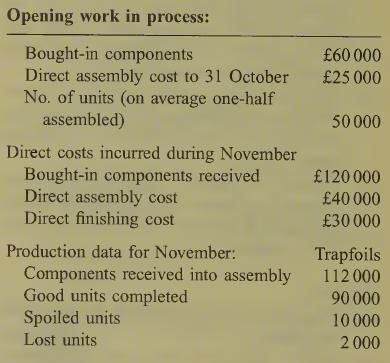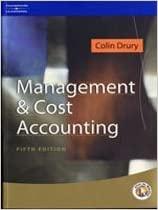Advanced: FIFO method and losses in process (a) You are required to explain and discuss the alternative
Question:
Advanced: FIFO method and losses in process
(a) You are required to explain and discuss the alternative methods of accounting for normal and abnormal spoilage. (8 marks)
(b) Weston Harvey Ltd assembles and finishes trapfoils from bought-in components which are utilized at the beginning of the assembly process. The other assembly costs are incurred evenly throughout that process. When the assembly process is complete, the finishing process is undertaken. Overhead is absorbed into assembly, but not finishing, at the rate of 100% of direct assembly cost.
It is considered normal for some trapfoils to be spoiled during assembly and finishing. Quality control inspection is applied at the conclusion of the finishing process to deter¬ mine whether units are spoiled.
It is accepted that the spoilage is normal if spoiled units are no more than one-eighteenth of the completed good units produced. Normal spoilage is treated as a product cost, and incorporated into the cost of good pro¬ duction. Any spoilage in excess of this limit is classed as abnormal, and written off as a loss of the period in which it occurs.
Trapfoils are valuable in relation to their weight and size. Despite vigilant security precautions it is common that some emits are lost, probably by pilferage. The cost of lost units is written off as a loss of the period in which it occurs. This cost is measured as the cost of the bought-in components plus the assembly process, but no finishing cost is charged.
Weston Harvey uses a FIFO system of costing.
The following data summarize the firm’s activities during November:
None of the opening work in process had at that stage entered the finishing process. Similarly, nor had any of the closing work in process at the end of the month. The units in the closing work in process were, on average, one-third complete as to assem¬ bly; none had entered the finishing process.
You are required:
(i) to calculate the number of units in the closing work in process; (3 marks)
(ii) to calculate the number of equivalent units processed in November, distinguishing between bought-in components, assembly and finishing; (6 marks)
(iii) to calculate the number of equivalent units processed in November, subdivided into the amounts for good units produced, spoilage, lost units and closing work in process.
Step by Step Answer:






